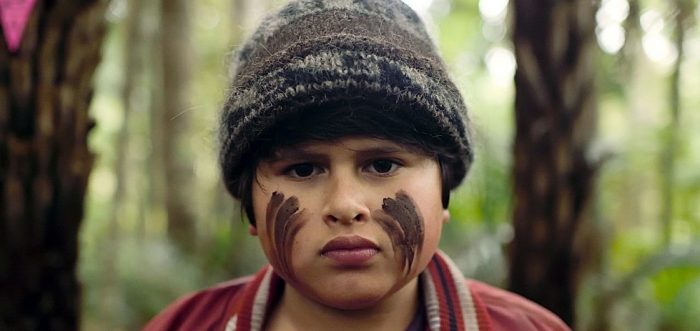
Films are among the few things marketed to children that see genuine quality as an incidental benefit. It’s only truer now that franchised cartoons and live-action adaptations of said franchised cartoons are nabbing the lion’s share of highest-grossing honours, though that overriding need for a familiar brand isn’t surprising when a family excursion to the cinema costs barely less than, say, a weekend trip to the country. Leave it to a bright spark like Taika Waititi to crib from the latter experience for Hunt for the Wilderpeople, his latest attempt to bring a luminous cinematic vision back to a kind of film that often suppresses it, following his 2010 smash-hit Boy. Said Wilderpeople are a wayward orphan Ricky (Julian Dennison) and his begrudging “Uncle” Hector (Sam Neill), and the hunt for them is a ride with turbulent action but buckets of heart that make it an adventurous kid’s dream come true.
The tale Waititi pens is an adaptation of Wild Pork and Watercress, a treasured children’s novel by New Zealand writer Barry Crump, and he embraces that storytelling tradition wholeheartedly, with new segments of the film introduced with numbered and named chapters, fading in with the quiet slowness of a page turn. We’re similarly basked in the setting from the very first chapter, since Lachlan Milne’s sterling cinematography making the humble mystery and magnitude of Ricky’s new valley home immediately apparent. The boy can hardly appreciate it at first however, with his child welfare agent Paula (Rachel House) rattling off his past transgressions and his new “Aunty” Bella (Rima Te Wiata) fawning over him as though he were a plump baby lamb, causing him to slump right back into the cop car that brought him there without uttering a word. In this funny dynamic, Waititi instantly clears the early hurdle of putting us inside the shoes (in this case, all-white kicks) of this young hero, which becomes crucial as he gives farm life a go and winds up showing both gentle intelligence and a charmingly naive self-image that’s part-Tupac Shakur gangsta poet1, part-Bear Grylls amateur survivalist.
He might tip over into being insufferable if not for scraggy, frumpy Neill emerging as Bella’s husband; a cantankerous straight man to his pre-adolescent fervour. The two and their respective pet dogs (who are adorable heroes in their own right, for the record) are thrust into each other’s care by both tragic and hilarious circumstances, and in this way we go from the gentle dramedy seen in Boy to a daring comedic manhunt that tests their combined wits. There’s a stumble or two on the way—for instance, it falls to one short scene to teach us that Hector is an illiterate ex-crim and that Paula is spreading that fact in the media to get locals to “rescue” Ricky back to Child Welfare, and a laboured gag referencing pedophilia doesn’t help matters—but Waititi remains a master of naturalistic humour that is quickly edited and sharply reflective of his characters. As a result, the escalation is incredibly charming and engaging, and the heady mix of action beats at the end (including a run-in with a wild boar and a Fury Road-like car chase in the Rangipo Desert) is a delightful surprise rather than a rude shock.
He also has a wonderful cast behind him making it work. Dennison and Neill have a peculiar dynamic that “chemistry” only goes so far to describe—they’re simultaneously at each other’s necks, craving each other’s approval, and just clueless enough to not realise what a great family this makes them. Wiata’s character is amusingly tone-deaf and tacky in the opening scene, but in small-but-great ways2 becomes not just the reason Ricky sticks around, but a beacon for his and Hector’s arcs as the journey continues—in this way, her amazing performance can’t be understated. Neither can House’s, but for wildly different reasons: not only does she continue the tradition of outlandish adult villains like The Goonies‘ Mama Fratelli, but she has her own delusions of grandeur that make Ricky’s look totally innocent by comparison, and her sidekick Andy (Oscar Kightley) is a happy counterpoint. Tioreore Ngatai-Melbourne and Troy Kingi as a straight-talking teen and her father ably carry the baton vis-a-vis Ricky’s figurative search for a home, while the rest of the supporting cast is full of comedic highlights that are refreshingly less story-vital, including Rhys Darby as a googly-eyed conspiracy nut and Waititi himself as the deliverer of the funniest funeral sermon I’ve ever heard.
For all the bursts of ’80s synth (part of a ripper score by music group Trifekta) and Wes Anderson-like eye for detailed kitsch, what truly sets Hunt for the Wilderpeople apart is a wistful streak that isn’t afraid to shine a light on dark corners. The aforementioned funeral carries weight, but the bureaucracy that shunts Ricky around is a sly evil that Waititi doesn’t shy away from, and he earns opportunities not only to poke fun at it with House’s arch villain, but also reveal its more sinister effect in a chilling story that Dennison relates at a campfire. The journey back to the light is just as sincere, with the symbolic appearance of an exotic bird, a rest stop at a spiritually significant lake, and a dazzling, mural-like panorama set to Leonard Cohen, all of which anchor the plot without slowing it to a halt. These and the rest of this lively adventure show Waititi as someone unafraid to assume the best of his viewers’ curiosity, be they old or young. Where Dreamworks and their ilk largely babysit, he opens the door with the invigoration of a great teacher. May he open many more.
Around the Staff
| Megan Nash | |
| Isobel Yeap | |
